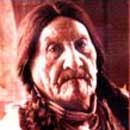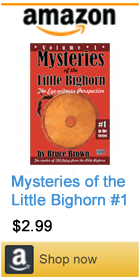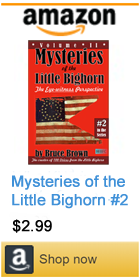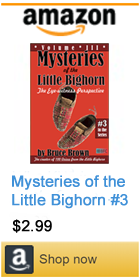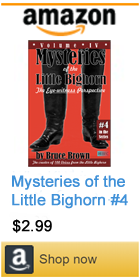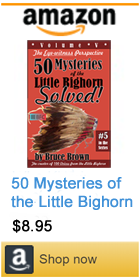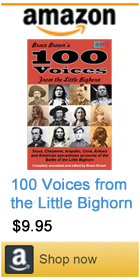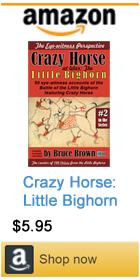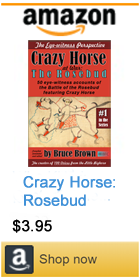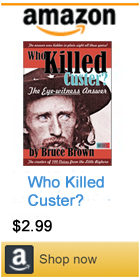|
|||||||
Bruce Brown's 100 Voices... Eagle Bear's Story of the Battle #2
EAGLE BEAR'S ACCOUNT #2
It was a strange interview this September day of 1938. Chief Eagle Bear's father had been a minor Sioux chief of the Ogallala clan. The father had been badly wounded in the Custer fight. Our friend, Eagle Bear, was sixteen years old at the time of the battle. This September day he was almost eighty -- the last of the Ogallala Sioux who had actually taken part in the historic fight. It was a strange and touching story that came so slowly and painfully from the lips of the dying old man. After each question there would be a long silence. The son-in-law, Philip Good Shield, would put our questions to the old Chief. He was lying back on his pallet, his eyes closed. In a thin voice, hardly more than a whisper, would come his words. He was talking out of the long ago. "I with the other young men were out with the horses when we first heard the firing. I rushed back on my favorite pony and picked up my pistol and bow and arrow. Others had tomahawks and clubs, and bows and arrows. Only a few of the young warriors had guns. I was lucky; I had a pistol, as well as my bow and arrow. "We started shooting at the soldiers down to the south of our tepees. We fought there for a while, and then the soldiers started to run away on their horses. We went after them. But soon the chiefs rode among us shouting, 'Everybody come this way. There are many soldiers down the river!' So we rode north as fast as we could." Slowly the words dropped from the dry lips of the old man. Now and again one of the Indians would fill a pipe, and the old man would take a puff or two. Then he would take up his story, answering the questions the best way he could, and trying to remember faithfully the little details. He was a very old man, even if he was only seventy-nine. "We rode down the river and crossed it, and came up behind the soldiers. It was a big fight . . . I do not know how long it lasted. I think maybe it was one hour and a half. . . . I do not think I saw Custer's body. There were a lot of dead soldiers everywhere . . . One soldier on a white horse almost got away-but we kept shooting at him, and before long we knocked him off his horse. "After the fight the squaws said, 'Come and get feast.' We had a big victory dance that night. We killed many, many soldiers but it did no good to us. We all had to go to the reservations."
"Yes, I was at the Greasy Grass," he answered through the interpreter. "But I was only eleven snows old. I was not in the fight. I was with the women, but I watched the fight. And afterwards we went over the field. There were many dead soldiers. I don't remember about cutting any of them with our knives. I was only eleven snows old when the fight took place." Fool's Crow slowly filled the red stone pipe, with the long blacked stem. After he had lit it, he passed it on to his brother. The dying old man opened his blood-shot eyes and nodded his thanks. He died before the snows fell that Fall. I Fought With Custer: The Story of Sergeant Windolf, Last Survivor of the Little Big Horn, as told to Frazier and Robert Hunt, Charles Scribner's Sons, New York 1947 p. 96 - 107
Here is another account of the battle by Eagle Bear. * * * Charles Windolph (sometimes spelled Windolf, especially in later years) was promoted to Sergeant on the Little Bighorn battlefield by Capt. Frederick Benteen, and was subsequently award the Medal of Honor for his valor at the Siege of the Greasy Grass. When this memoir appeared in 1947, he was billed as the last living member of the Seventh Cavalry who fought at the Little Bighorn. |
|||||||



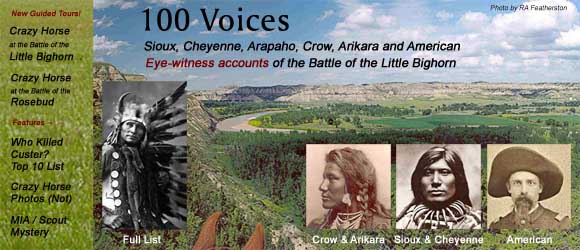
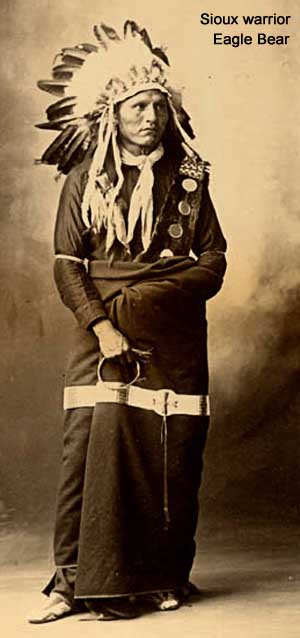 IN AN OLD cabin three miles north of Porcupine in the Pine Ridge Reservation in South Dakota, we located old Chief Eagle Bear. He was lying on a cot inside the log but and he was obviously about to die. Sitting on a box at the head of the cot, fanning his father-in-law with a turkey feather, was Philip Good Shield. Squatting on the floor with his back against the wall at the foot of the cot were Jealous and Standing Bear. On a bench by the door, sat our interpreter, Tom White Cow Killer.
IN AN OLD cabin three miles north of Porcupine in the Pine Ridge Reservation in South Dakota, we located old Chief Eagle Bear. He was lying on a cot inside the log but and he was obviously about to die. Sitting on a box at the head of the cot, fanning his father-in-law with a turkey feather, was Philip Good Shield. Squatting on the floor with his back against the wall at the foot of the cot were Jealous and Standing Bear. On a bench by the door, sat our interpreter, Tom White Cow Killer.